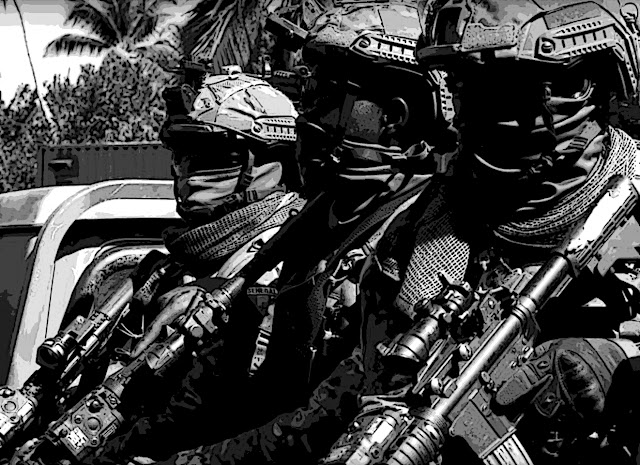 |
| Still from clip. |
Ivory Coast is not exactly a paradise of human rights. The US State Department reported in 2023 that: Significant human rights issues included credible reports of arbitrary or unlawful killings, including extrajudicial killings; torture or cruel, inhuman or degrading treatment or punishment by the government; harsh and life threatening prison conditions; arbitrary arrest or detention; serious restrictions on freedom of expression and media freedom, including censorship; substantial interference with the freedom of peaceful assembly; serious government corruption; and violence against lesbian, gay, bisexual, transgender, queer, or intersex persons. The government did not consistently take credible steps to identify and punish officials who may have committed human rights abuses. The Dutch special forces training offers more tools for repression, although claims to also train on making arrests in juridically correct ways.
Did someone already question the wisdom of this deployment? The wiki on Flintlock states: “There is concern, however, that forces trained by American Special Forces go on to use their new skills to commit war crimes in their home countries and would pose a threat to the stability of the regions.” It is time for more control and scrutiny of what knowledge is provided to whom and how this fits in a ethic security policy.
Control does not have to start from scratch. The United States has a long running debate on policyaround military training, for examle on the International Military Education and Training program (IMET). It is defined as “security assistance” which includes, in the US definition, “military assistance, economic support funding, military education and training, peacekeeping operations, antiterrorism assistance, etc.” According to the standard US military handbook, the Green Book, this falls under control of the US Foreign Assistance Act and the Arms Control Act.
“Under the George W. Bush administration, human rights took a back seat to the immediate strategic interests of the United States,” Professor of Strategy Mariya Omelicheva together and two cowritersIII noted. It shows that even in cased rules exist political consideration can overtake them in the world of the military great power policies.
What policies exist in the European nations on this issue is
difficult to find out. In the Netherlands there is no established policy
al all and in 2021 the Dutch Minister of Defence answered to Parliamentary questions that it is “not customary to inform the House about Dutch participation in military exercises.”
But to implement a more mature policy is no rocket science. Like the
export of military technological knowledge, military training can and
must also be measured along the lines of an ethical foreign policy. The
criteria of arms export control regimes can be simply used as point of
departure.
Notes:
I This clearly connects to the goal of the
Africa Frontex Intelligence Community (AFIC) which has established
itself (with one of the eight African risk cells) in Ivory Coast focussing on risk analysis for border control capacity and prevention of cross-border crime. See: Frontex celebrates “expanding footprint” beyond the EU in report on third country cooperation, Statewatch, 18 August 2022. In a paper written August 2024 by Nigrian author Ngozi Louis Uzomah of the University of Nigeria it reads: “the
use of EU‐funded technological projects for border management infringes
on the historical cross‐border mobility in North and West Africa which
is essential for socioeconomic exchanges and escaping conflicts.” (See also).
II The involvement of Benin was mentioned in Egmont Policy Brief 361 | What’s brewing in Benin? Security collaboration in the Gulf of Guinea. It states: “In
the current climate of anti-Western sentiments on the African
continent, and in particular in West Africa, overburdening a state with
Western military presence may weaken the government and result in both a
political and military backlash if security forces and/or opposition
actors do not align with the government’s policy.”
III Mariya
Omelicheva, Professor, National Security Strategy at the National
War College; Dr. Brittnee
A Carter, Associate Professor, specialised on terrorism and
counterterrorism, interstate conflict and security studies, political
methodology at University of Kansas; and Luke
B. Campbell, Associate Professor of
Political Science at Northwest Missouri State University.

